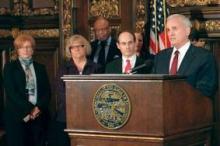As the GOP presidential candidates begin campaigning in Minnesota this week, they will face the critical health policy debate going on in many states – what to do about the Affordable Care Act.
Minnesota Gov. Mark Dayton (D), who was elected in a tight race in 2010, supports the federal health reform law and has been working to set up a state-run health exchange where residents can go to shop for health insurance beginning in 2014. But the work has been controversial. Although some traditional GOP constituencies like the Minnesota Chamber of Commerce support the efforts of Gov. Dayton, legislation to approve the exchange has so far failed to gain traction in the Republican-controlled state legislature.
Just a week before the Feb. 7 GOP caucus in Minnesota, Gov. Dayton announced further progress on the exchange, releasing recommendations from a 15-member task force. Meanwhile, Republicans in the legislature, who did not participate in the governor’s task force, began hearings on the issue.
It’s against that backdrop that the GOP presidential hopefuls will need to make their case to caucus voters. All of the Republican candidates have come out against the health law and vowed to repeal it. But in the run-up to the Jan. 31 Florida primary, the front runners – former Massachusetts Gov. Mitt Romney and former House Speaker Newt Gingrich – launched a series of attacks, accusing each other of supporting the controversial individual mandate requiring Americans to purchase health insurance.
Lawrence Jacobs, Ph.D., a professor of political science at the University of Minnesota’s Humphrey School of Public Affairs, said he expects that the candidates will continue to hit each other hard on the Affordable Care Act (ACA).
"It’s a major issue to conservative voters that are participating in the caucuses and the primaries. The candidates are trying to curry favor with the conservatives by proving that they are more hostile [to the ACA] than the other," Dr. Jacobs said. "I think we’re going to see a continuation of the same ballet steps we saw in Florida and South Carolina and New Hampshire and Iowa."
Dr. Philip Stoyke, the legislative chair for the Minnesota Academy of Family Physicians, which supports the ACA, said he’ll be watching the Republican candidates to see if they give any further details on their alternatives to the health law.
The candidates have said they favor free market alternatives, but have been short on specifics. "We have some concerns about that," Dr. Stoyke said.
Republicans will also be casting their votes in Colorado, which holds its caucus on Feb. 7. That state has a mixed track record when it comes to the ACA.
The state’s attorney general, John W. Suthers (R), has joined a multistate lawsuit challenging the law, which will be considered by the U.S. Supreme Court in March.
But in 2010, Colorado voters rejected a ballot measure that would have barred the state from complying with the rules of the ACA. And the state’s Governor, John Hickenlooper (D), has been working with both parties in the state legislature to design a state-run health exchange.
Dr. Robert Brockmann, president-elect of the Colorado Academy of Family Physicians, said he will be watching to see if the candidates talk about the health exchanges, an issue that he said is likely to be important to the large number of small businesses operating in the state. Another issue of importance to Colorado physicians is Medicaid provider payments. He said payments need to be higher to ensure that the influx of new Medicaid patients can gain access to care.
But despite the interest surrounding the health law, experts said health care is unlikely to play a major role in the GOP caucus there.
"My sense is that health care is just not prominent right now in the political agenda," said E. Scott Adler, associate professor of political science at the University of Colorado, Boulder.
Officials at the Colorado Medical Society agreed, saying that they didn’t know of any pressing health policy issues likely to be addressed during the upcoming GOP caucus.
This is the second in a series of articles looking at the Republican presidential primaries through the eyes of physicians. Next up: The Super Tuesday states cast their ballots March 6.



